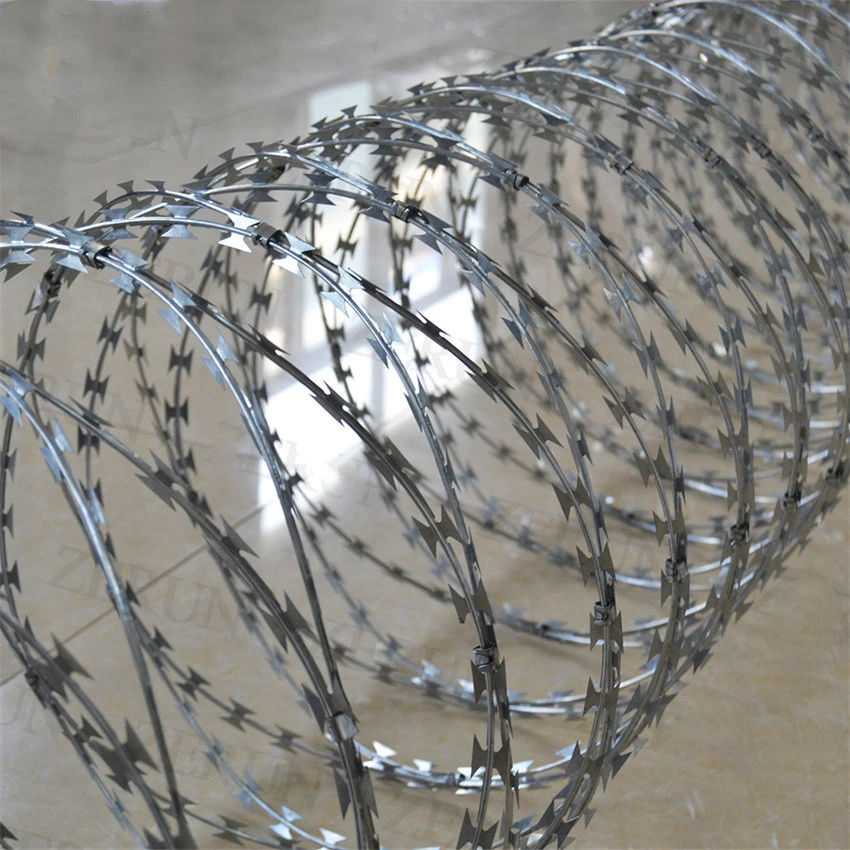Dec . 15, 2024 02:29 Back to list
razor wire
The Use and Impact of Razor Wire in Modern Security Solutions
In an era where security concerns are more paramount than ever, the use of various security measures has become commonplace across residential, commercial, and industrial settings. Among these, razor wire stands out as one of the most effective deterrents to unauthorized access and intrusion. With its sharp, serrated edges, razor wire presents not only a physical barrier but also a psychological one, instilling fear in would-be trespassers.
Razor wire, often made from high-tensile steel, is designed to prevent intrusion through its acutely dangerous edges that can inflict severe injuries. This form of fencing typically comes in coils or rolls, with barbs or blades that protrude outward. It is often used in conjunction with traditional fencing to enhance security measures. Its origins can be traced back to the early 20th century, when it was developed as a more effective alternative to barbed wire, which, while hazardous, did not provide the same level of deterrence as razor wire.
One of the primary applications of razor wire is in high-security facilities such as prisons, military installations, and government buildings. These sites demand the highest level of security due to the risks associated with potential breaches. The psychological impact of razor wire cannot be underestimated; its presence often serves as an immediate warning that unauthorized access will result in serious consequences.
However, while razor wire may be suitable for certain applications, its use can be controversial. Humanitarian advocates frequently criticize razor wire for its potential to inflict severe injuries or even fatalities, particularly when used in areas where individuals may inadvertently come into contact with it. This concern is especially relevant in regions facing humanitarian crises, where displaced populations might encounter such barriers while seeking safety or shelter. As a result, some jurisdictions have begun to regulate the use of razor wire, urging the exploration of alternatives that provide security without compromising human safety.
razor wire

Moreover, the installation of razor wire raises significant legal and ethical questions. Property owners must navigate a complex landscape of local laws and regulations, as improper use or installation can lead to liability issues. In certain cases, if someone is injured due to razor wire, property owners may find themselves facing lawsuits or penalties, particularly if due diligence in ensuring safety measures has not been met.
Despite these concerns, the effectiveness of razor wire in enhancing security cannot be overlooked. In commercial settings, for example, razor wire is frequently employed to protect valuable assets, deter theft, and prevent vandalism. Businesses often see the return on investment through the prevention of costly property damage and loss. The visual presence of razor wire also creates an immediate psychological barrier, dissuading criminal activities before they even begin.
In addition to its application in physical security, combined technologies are integrating razor wire into advanced security solutions. Modern surveillance systems, coupled with the presence of razor wire, create a multilayered security approach that is more difficult for intruders to circumvent. These systems often include motion sensors, cameras, and alarms that trigger if the razor wire is tampered with, thereby enhancing overall security measures.
Furthermore, as society increasingly embraces technological advancements, the future of security may see an evolution in how razor wire is utilized. Innovations such as smart sensors embedded within the wire could provide real-time alerts when someone approaches, thereby enhancing response times for security personnel.
In conclusion, while razor wire serves as a robust and effective security measure, its implementation necessitates careful consideration of the associated ethical and legal implications. As technology evolves, so too will the methods we employ to keep our environments safe. Balancing security needs with humanitarian considerations will be paramount as society continues to address the complexities of modern security solutions. Whether in high-security facilities or commercial settings, the role of razor wire will undoubtedly remain a topic of discussion as we seek safer and more humane approaches to guarding our spaces.
-
Reinforcing Mesh: Core Material of the Construction Industry
NewsJul.07,2025
-
Welded Wire Fabric Reinvented for Modern Projects
NewsJul.04,2025
-
Superiority of Stainless Steel Woven Mesh
NewsJul.04,2025
-
Key Types of Razor Wire and Their Applications
NewsJul.04,2025
-
Durable Metal Fence Types for Security
NewsJul.04,2025
-
Best Materials for Livestock Fence
NewsJul.04,2025
products.







